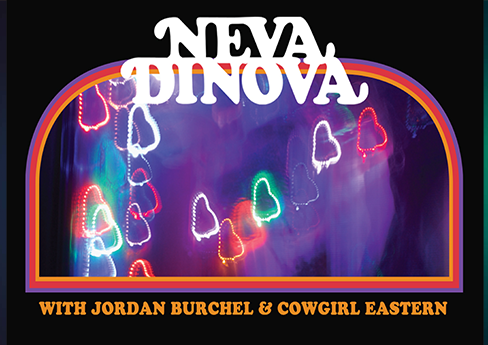Bingo Loco – LATE SHOW
THIS EVENT IS 21+ ⭐ Bingo Loco – The Wildest Bingo Party in Omaha!Looking for the most outrageous bingo party in the USA or the top-rated bingo show in Canada? Welcome to Bingo Loco, the interactive live event that’s taken North America by storm. We’ve turned traditional bingo on its head—this is a full-blown party rave with DJs, dance-offs, lip-sync battles, confetti showers, and wild prizes you won’t believe.🔥 Highlights🌍 Global Hit: After selling out in over 200 cities worldwide, Bingo Loco lands in Omaha for one of its biggest nights yet.🕺 Insane Energy: Expect a high-octane stage show with rave rounds, dance battles, hype DJs, and confetti explosions.🎁 Crazy Prizes: Win everything from a Vegas vacation to air fryers, inflatable flamingos, lawnmowers, or even a fridge!🎶 Epic Throwbacks: Dance to hits from the 80s, 90s, and 00s—from ABBA to Britneys Spears.😂 Comedian MCs: Your hilarious hosts will have you laughing and dancing all night long.😍 Still not sure? See exactly ‘what is bingo loco’ right here!📍 General Info⏳ Duration: Approx. 3 hours of high-energy entertainment📌 Location: The Admiral Theater👤 Age Limit: 21+ (ID required)♿ Accessibility: Contact venue for accommodation options🎉 DescriptionGet ready as Bingo Loco is crashing into Omaha nightlife with a wild mix of bingo, rave, and comedy like nothing you’ve seen before. Picture this: comedian MCs, DJ-spun throwbacks, mountains of confetti, and crowd-hyping CO2 cannons—all while you play high-stakes bingo for outrageously fun prizes.Whether you’re planning a night out with friends, a birthday celebration, or looking for a unique event in Omaha, this is the party you don’t want to miss.
Omaha Rocks Unplugged
Our annual Omaha Rocks Unplugged event is finally returning to the Waiting Room Lounge on Friday August 8th. As always the event is wide mix of local musicians from our metal and hard rock scene as well as singer/songwriter. Each act performs for 15 minutes doing a wide range of covers and or original material. Always a fun night and always a CHILL night. Please come join us and support your local music scene. Featuring: Kyle McCarthy, Surreal The MC, Blake Jones w/ Tony Stanton, Mike Wolhutter w/ Ricky Szablowski, Arcade Riot, Save The Hero, In Bloom, Ryan Lieb, and more TBA!
Krisiun
Honeybee
JIVEBOMB
JIVEBOMB is Kat, Ethan, Harper, David, and Nick. Rising out of Baltimore’s groundbreaking hardcore scene in 2021, JIVEBOMB’S ruthless blend of hardcore punk and intense live show quickly made them a band to watch. Dropping a demo that year, the band grabbed the attention of Flatspot Records and released their first proper EP, Primitive Desires, in 2022. The EP received praise from Stereogum, The Fader, and BrooklynVegan, and the band went on a whirlwind of touring alongside acts including Angel Du$t, Soul Glo, Fleshwater, Spy, and Candy. JIVEBOMB’S brazen and gut-wrenching style continues to grow, and takes on a more extreme form on the band’s upcoming debut album, ETHEREAL, out March 28th, 2025 on Flatspot Records. ETHEREAL is defined as “extremely delicate and light in a way that seems too perfect for this world.” A pure contradiction to JIVEBOMB’S sound, yet a perfect match to the band’s lyrics that drive from a dissociative dreamlike state. Entering the studio in summer 2024 with Ben Greenberg (Uniform) at Circular Ruin in Brooklyn, NY, JIVEBOMB knew they wanted to keep their raw, blitzed out energy while diving into heavier territory. Spanning ten tracks, ETHEREAL clocks in at thirteen minutes of destructive chaos pulling from hardcore, grindcore, and the extremities of music. Opener “THE IMPACT” greets you with distorted samples before vocalist Kat snarls “Don’t get it twisted, get it right” setting the tone for what’s to come. The sonic ricochet of “ESTRELA” moves through heaven-like lyrics that allude back to the album’s title. Lead single “SURVIVAL AIN’T TAUGHT” is pure hardcore intensity pushed through thick, vibrating guitars. 2021 demo tracks “WISE CHOICE” and “Cidade Charme”, now “CHARM”, get transformed into more feverish versions translating how they’re performed in a live setting. “SERAPHIM (MARINA’S SONG)” bodes yearning for something intangible, while delivering with winding metal riffs. ETHEREAL ends with the damaging “DISFIGURED IDENTITY” sending off with a unique spin. As Kat shares, “The sound design at the end of this song is made up almost entirely of audio recordings I took ofrandom sounds while Jivebomb was in Europe, chopped and screwed style.” With the release of ETHEREAL, JIVEBOMB have delivered a unique and rapid debut that urges repeat listens while building anticipation for what the band will create next.
Cursive – You’re In My Web Now: An Evening in Three Parts Performing ‘Domestica’ and ‘The Ugly Organ’
In preparation for their double duty performance at Best Friends Forever Festival in Las Vegas, Cursive thought we would do something special at home, in Omaha! On October 8th they will play both Domestica and The Ugly Organ in full as a unique event. The evening (which they are dubbing ‘Your In My Web Now’ will comprise of three acts. Act 1 – Cursive Performing Domestica Intermission Act 2 – The Appleseed Cast performing a career spanning set Intermission Act 3 – Cursive Performing The Ugly Organ (and more) This is a truly special event and tickets will go on sale at 10am Friday.
Wreckno
A marriage of senses between the beautiful and the bizarre, Wreckno incomparably unites bass electronic, pop culture, and queer identity. The Detroit-based rapper/producer/DJ has pioneered their own lane with their signature, sassy vocal toplines paired with a heavy bass line and sickening genderfluid looks. Praised by Forbes, Billboard, DJ Mag, Paper Magazine and more, Wreckno has continued to unapologetically shatter norms in the electronic music space. DJ Mag said, Wreckno is “breaking boundaries and fostering inclusive spaces so others like them can reach the stars.”
Post Sex Nachos
Hailing from the middle of the middle of the Midwest comes a band that bends genres and produces tunes that’ll make you want to roller-skate and two-step to your heaviest feelings: Post Sex Nachos. Charging into battle for the love of the music, these roller-coaster rockers are here to redefine the term “boy band” forever. This 5-piece with a fantastically unique Venn diagram of influences and musical backgrounds continues to constantly reimagine the scope of what they can do with their art. Comprised of Mitch Broddon (lead guitar, support Vox), Sammy Elfanbaum (rhythm guitar, lead Vox), Kevin Jerez (keyboards, support Vox), Chase Mueller (bass, support Vox), and Hunter Pendleton (drums), Post Sex Nachos doesn’t just record music for virtual consumption – they bring it to the fans who matter most. Performing to sold-out rooms from coast to coast, Post Sex Nachos delivers a raw, once-in a-generation live show, replete with pop-hook singalongs that sweep you up, solos to make you quake, and grooves worth diving head first into. Veritable road dogs, Post Sex Nachos recently announced their next venture, dubbed “The Minor League”. Fitting, eh?
Early James
“It’s a house with a lot of character,” Auerbach says. “I’ve always loved it. I always felt inspired when I was there. I knew it would be a fun place to do something. It’s over a hundred years old. It’s got the old plaster on the walls, plaster ceilings, old wallpaper. There are big oak floors and an oak stairwell. The first floor has twelve-and-a-half-foot ceilings. It’s pretty awesome. But it’s not a recording studio by any means.” “We had to drag all the gear in there. We set the little mixing console upstairs — this crazy, wild old ’50s Universal Audio tube console that I’d just gotten and fixed up, which was built by FAME Studios’ Rick Hall for his studio in Memphis — in a spare bedroom, and we ran the wires down the stairs. We set up James and everyone in separate little rooms downstairs. James’ little Princeton amp was right behind him, there were no baffles or anything, and so when he was Early James recorded his first two Easy Eye Sound albums, Singing For My Supper (2020) and Strange Time To Be Alive(2022), at the studio inside the vaunted label’s Nashville headquarters. But for James’ third release, Medium Raw, producer and Easy Eye Sound label head Dan Auerbach envisioned something quite different for the Alabama-bred singer-songwriter-guitarist’s rawboned, sometimes scarifying music. “Day of the first session, I had my GPS routed to Easy Eye,” James recalls. “We ran into some traffic, and I texted [engineer M.] Allen [Parker] — ‘Hey man, sorry, we’re gonna be about 15 minutes late.’ And he said, ‘It’s OK, we’re still getting set up at the house.’ And I was like, ‘What house?’ ‘We’re recording at this house, it’s really cool.’ It was news to me! It felt unusual in the moment, which I think makes you play the songs differently. But I’m really happy with and proud of the results.” “I wanted to try to find that power of when I first saw him, when it was just him and his guitar,” Auerbach explains. “After working with him a couple of times in the studio, I felt like I wasn’t going to be able to do it in the same kind of way. The comforts and luxuries of the studio, where you’re able to hear everything and make adjustments and changes, wasn’t right for this project.” The house in question, known as “Honky Chateau,” was an old Nashville property owned by photographer and artist Buddy Jackson. The writing continues to display the hallmarks of James’ distinctive, one-of-a-kind style: whip-smart wordplay, upended clichés, humor both light and dark, and a deep intelligence that frequently reflects a literary sensibility. His musical sensibility has leaned toward the hard stuff from an early age: “I remember getting obsessed with the blues and getting obsessed with old country. My first favorite musician was Hank Williams. There was something about how dark that music was. I could listen to Hank Williams on repeat and never get tired of it. Hank Williams, Jr., lives in my hometown of Troy, Alabama, and he and my dad were hunting buddies. They still run into each other at Julia’s Restaurant in Troy. I listened to a lot of Howlin’ Wolf, and his guitarist Hubert Sumlin — I thought that was Howlin’ Wolf playing the guitar.” Like the rambling bluesmen of old, whose repertoires would mutate from night to night, James says audiences should expect him to work some new wrinkles into his songs on stage: “I’m trying to play dress-up with this record on the road. You never know what it’s going to be wearing. It depends on what thrift store we get to.”
Neva Dinova

